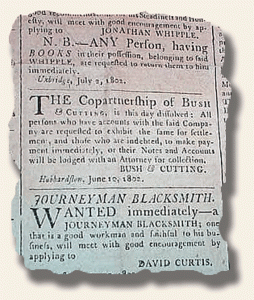How the Newspaper Changed the Press: Providing Contextual History…
September 2, 2010 by GuyHeilenman · Leave a Comment
Imagine the newspaper in pre-revolutionary Virginia. It’s the only one in the state, so the governor has complete control over everything that’s published in it. His is the only opinion expressed, and if anything about a newspaper page fails to agree with him, it’s discarded and replaced. Thomas Jefferson sums it up by saying that it’s “no competitor for public favor.” One of the most attractive elements of a newspaper for the public is its variety of opinions, which ensures that everyone can find something to agree and disagree with when they read it. What is a newspaper without multiple viewpoints, opinions, and descriptions of events?
Context is one important characteristic that distinguishes the pre-revolutionary newspaper from the modern one. Now, newspapers allow us to define context using not only the circumstances and facts surrounding an event, but also the wide variety of public opinions and perspectives. This additional facet of contextual history provides a wealth of detail, dimension, and complexity to the texture of events and situations covered in newspapers.
The Turning Point of the Newspaper
Roger Mellen of George Mason University has researched the origins of newspaper competition, working to contradict the assumption that Thomas Jefferson was responsible for bringing it to Virginia. Mellen contends that it was the Stamp Act, not Jefferson, which influenced a second newspaper printer to relocate in Virginia, instigating competition against the governor’s newspaper. Because printers had to pay extra taxes on their products, they were motivated to sell more newspapers by allowing for civic discourse, taking sides on issues, and becoming more opinionated. Printers realized that the “public favor” mentioned by Jefferson was best courted by publishing dramatic political writing, a phenomenon that grew and changed with the public both during and after the revolution. With the public steering the direction of newspapers, the government no longer had the sole influence on what was published, and the scope of contextual history was broadened significantly.
Collecting Context
The way newspapers capture contextual history is just one of many characteristics that influence collectors to continuously search out and buy them. Finding contrasting opinions on a significant political issue, reading different accounts of the same important situation, and even locating various photos depicting the same event can be exhilarating. Tracking the changes in leading public opinion across an extended time period, comparing historical events to modern ones, and finding historical patterns are also hobbies that are enabled by newspapers’ contextual history. No matter what their interests, everyone can learn something from and enjoy the process of collecting newspapers.
Bio: Alexis Bonari is a freelance writer and blog junkie. She is currently a resident blogger at First in Education, researching areas of online education. In her spare time, she enjoys square-foot gardening, swimming, and avoiding her laptop.
Featured websites – TeachHistory.com
March 18, 2010 by GuyHeilenman · Leave a Comment
 Teachers with a love of history, listen up! The following resource can improve your curriculum and make you a stronger educator. Students of history will enjoy the breadth and depth of the historical journey as well.
Teachers with a love of history, listen up! The following resource can improve your curriculum and make you a stronger educator. Students of history will enjoy the breadth and depth of the historical journey as well.
TeachHistory is a fantastic website (blog), developed and maintained by Ben Edwards, which provides engaging information & a plethora of useful educational resources related to history. It describes itself as:
“a blog dedicated to social studies and history teachers across the United States who use Colonial American history, imagination and multisensory teaching methods to inspire their students. Our goal is to provide a resource where teachers like you can access information about colonial history plus technologies, methods and products that are making a difference in education today.”
While Ben’s experience with teachers and students is varied, perhaps the most useful channel for keeping him in touch with the pulse of teacher/student interests and needs occur via the many intimate conversations had while engaging teachers and students through his Walking Tours of Historic Boston. Combine this with both his (historic) heritage and his natural love of history, and you have the making of a blog which is sure to stay relevant over time. Some of the recent posts include:
Colonel Shaw, Sergeant Carney and the 54th Massachusetts
Remembering Alex Haley and Roots
Black History Month: A Tribute to Phillis Wheatley
Young Ben Franklin and the Silence Dogood Letters
Teachers: Are You Engaging AND Empowering Your Students?
Many of the posts include detailed images and reference accounts of actual Rare & Early Newspapers – most of which come from his personal collection. Ben fully grasps a foundational truth regarding primary sources: “History is never more fascinating than when it is read from the day it was first reported.” Thanks Ben, for your contributions to both the Rare Newspapers and Educational communities.



